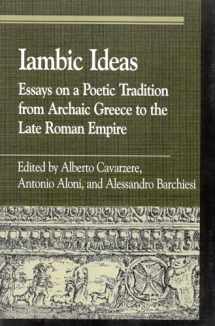
Iambic Ideas: Essays on a Poetic Tradition from Archaic Greece to the Late Roman Empire (Greek Studies: Interdisciplinary Approaches)
ISBN-13:
9780742508170
ISBN-10:
074250817X
Author:
Alessandro Barchiesi, Alberto Cavarzere, Antonio Aloni
Publication date:
2001
Publisher:
Rowman & Littlefield Publishers
Format:
Paperback
278 pages
Category:
Linguistics
,
Words, Language & Grammar
FREE US shipping
Book details
ISBN-13:
9780742508170
ISBN-10:
074250817X
Author:
Alessandro Barchiesi, Alberto Cavarzere, Antonio Aloni
Publication date:
2001
Publisher:
Rowman & Littlefield Publishers
Format:
Paperback
278 pages
Category:
Linguistics
,
Words, Language & Grammar
Summary
Iambic Ideas: Essays on a Poetic Tradition from Archaic Greece to the Late Roman Empire (Greek Studies: Interdisciplinary Approaches) (ISBN-13: 9780742508170 and ISBN-10: 074250817X), written by authors
Alessandro Barchiesi, Alberto Cavarzere, Antonio Aloni, was published by Rowman & Littlefield Publishers in 2001.
With an overall rating of 3.6 stars, it's a notable title among other
Linguistics
(Words, Language & Grammar ) books. You can easily purchase or rent Iambic Ideas: Essays on a Poetic Tradition from Archaic Greece to the Late Roman Empire (Greek Studies: Interdisciplinary Approaches) (Paperback) from BooksRun,
along with many other new and used
Linguistics
books
and textbooks.
And, if you're looking to sell your copy, our current buyback offer is $0.3.
Description
Iambic Ideas, explores the concept of the 'iambic' as a genre. In a set of detailed studies, the contributors examine, across time, the idea of iambic through a wide variety of cultural settings-Greek, Hellenistic, Roman, and late antiquity. What emerges most clearly is that the 'iambic idea' is impossible to define in absolute terms: rather, the form of iambic keeps varying in response to a vast variety of historical contingencies. The variation is evident in such critical terms as the 'iambic tendency' in Sappho, the 'reusing of iambi' for Roman epodes, and even the instances of 'iambic absence' in comedy and other such related forms. In the end, what is most characteristic about the 'iambic' is its own inherent variability.


We would LOVE it if you could help us and other readers by reviewing the book
Book review

Congratulations! We have received your book review.
{user}
{createdAt}
by {truncated_author}


